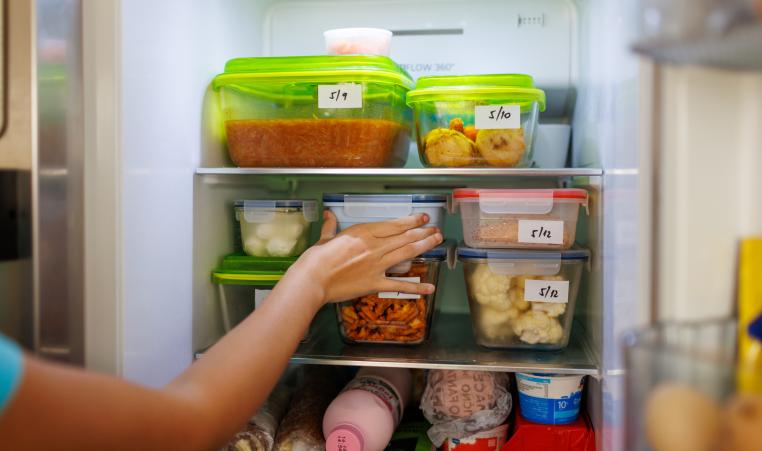Nutrition Beyond the Table: Promoting Sustainability for National Nutrition Month

As we celebrate National Nutrition Month, it’s essential to recognize that nutrition extends beyond the food on our plates. Embracing sustainable practices not only benefits our planet but also plays a significant role in promoting overall health and well-being. One critical aspect of sustainable nutrition is reducing food waste from school, our work environment, and our homes. By minimizing food waste and adopting eco-conscious habits, we can contribute to a healthier planet and foster a more sustainable future for generations to come.
Here are four tips to help reduce food waste and promote sustainability:
Plan Meals Mindfully: One of the most effective ways to reduce food waste is by planning meals mindfully. Before heading to the grocery store, take inventory of what you already have on hand and plan meals based on ingredients that need to be used up first. Create a shopping list and stick to it, avoiding impulse purchases that may lead to excess food that could go to waste. Meal planning not only helps reduce food waste but also saves time and money in the long run.
Embrace Leftovers Creatively: Leftovers often end up forgotten in the back of the fridge, only to be discarded days later. Instead of letting leftovers go to waste, embrace them creatively by incorporating them into new meals. Repurpose leftover vegetables into soups, stir-fries, or omelets. Cooked grains like rice or quinoa can be transformed into salads or grain bowls. Get creative and experiment with different flavor combinations to breathe new life into leftovers and minimize food waste.
Practice Proper Storage Techniques: Proper storage is key to preserving the freshness and longevity of perishable foods. Invest in quality storage containers that are airtight and freezer-safe to extend the shelf life of leftovers and perishable items. Store fruits and vegetables in the refrigerator's crisper drawer, and be mindful of ethylene-producing fruits like apples and bananas, which can accelerate ripening and spoilage in other produce. Additionally, learn about proper food storage temperatures to ensure optimal freshness and safety. For example, did you know that citrus and bread last longer if stored in the fridge?
Compost Food Scraps: Despite our best efforts, there will inevitably be food scraps and trimmings that are not suitable for consumption. Instead of tossing them in the trash where they end up in landfills, consider composting food scraps to create nutrient-rich soil for gardens and plants. Many communities offer composting programs, or you can set up a compost bin in your backyard. Composting not only reduces methane emissions from decomposing food in landfills but also helps close the nutrient loop and enrich the soil.
As we observe National Nutrition Month, let us remember that our choices extend far beyond the table. By reducing food waste and promoting sustainability, we can make a meaningful impact on our health and the health of the planet. Each small action we take, from mindful meal planning to composting food scraps, contributes to a more sustainable food system and a brighter future for generations to come. Let us embrace the power of nutrition beyond the table and cultivate a culture of sustainability in our homes, workplaces, and communities.
Sustainable Vegetable Stir-Fry with Tofu
Ingredients:
1 block of firm tofu, pressed and cubed
2 tablespoons soy sauce or tamari
2 tablespoons sesame oil
2 cloves garlic, minced
1 tablespoon grated ginger
1 onion, sliced
2 carrots, sliced
1 bell pepper, sliced (any color)
1 cup broccoli florets
1 cup snow peas, trimmed
1 zucchini, sliced
2 tablespoons vegetable oil (for stir-frying)
Cooked rice or quinoa, for serving
Instructions:
1. In a bowl, combine the cubed tofu with soy sauce or tamari and 1 tablespoon of sesame oil. Allow the tofu to marinate for at least 15-20 minutes to absorb the flavors.
2. In a small bowl, whisk together the minced garlic, grated ginger, and remaining 1 tablespoon of sesame oil. Set aside.
3. Heat the vegetable oil in a large skillet or wok over medium-high heat. Add the sliced onion and carrots, and stir-fry for 2-3 minutes until they begin to soften.
4. Add the bell pepper, broccoli florets, snow peas, and sliced zucchini to the skillet. Continue to stir-fry for an additional 5-7 minutes, or until the vegetables are tender-crisp.
5. Push the vegetables to one side of the skillet, and add the marinated tofu to the empty space. Cook the tofu for 4-5 minutes, or until golden brown and crispy on all sides.
6. Pour the prepared sauce over the vegetables and tofu in the skillet. Toss gently to coat everything evenly with the sauce. Remove from heat.
7. Serve the sustainable vegetable stir-fry with tofu over cooked rice or quinoa. Garnish with sesame seeds or chopped green onions if desired.
This recipe celebrates sustainability by highlighting plant-based ingredients and minimizing food waste. Tofu provides a nutritious and protein-rich alternative to meat, while a variety of colorful vegetables add flavor, texture, and essential nutrients. By choosing locally sourced and/or organic produce whenever possible, you can further reduce your environmental footprint and support sustainable farming practices. Enjoy this delicious and eco-friendly meal that’s as good for you as it is for the planet!
Patricia Esparza, RDN is a Registered Dietitian with the YMCA of Metropolitan Dallas. She earned her Master’s degree in Human Nutrition from Viterbo University and is a Licensed Dietitian. Patricia has a wide variety of experience in clinical dietetics and public health nutrition. Her own journey with health and wellness, has fueled her passion for nutrition education to build healthier communities
